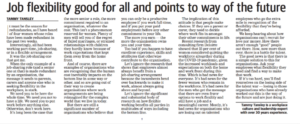
Job flexibility good for all and points to way of the future
TAMMY TANSLEYIt must be the season for redundancies, as I have heard of four women whose roles have been made redundant in the past two weeks.
Interestingly, all had been working part-time, job-sharing, or in a flexible arrangement.
It was the job sharing one that got me.
When the only example of a job-sharing role (and a senior one at that) is made redundant by an organisation, the message it sends to parents, carers and anyone else who is seeking flexibility in the workplace, is stark.
We need you to be here the whole time. We need you not to have a life. We need you to put work before anything else. Otherwise, don’t work here.
It’s long been the case that the more senior a role, the more commitment required to an organisation, whatever the cost. This isn’t a phenomenon reserved for women. Plenty of men will tell you of the regret of failed marriages, or strained relationships with children they hardly know because of work expectations that kept them away from the home front.
And of course, there are examples of organisations who are recognising that the human cost inevitably impacts on the bottom line in some way or other, and so are going out of their way to create organisations where work arrangements are being reimagined for the complex world that we live in today.
But there are still a significant number of organisations who believe that you can only be a productive employee if you work full-time, and if you put your paid employment before any other commitment in your life.
The more you earn — the more the organisation owns you and your time.
Too bad if you happen to have excellent experience, skills and attributes that otherwise contribute to the organisation.
Let’s ignore the research that shows that employers almost always benefit from a job-sharing arrangement because the incumbents bend over backwards to make it work, almost always going above and beyond.
Let’s ignore the significant and substantial body of research on how flexible working benefits all parties in multitudes of ways including the bottom line.
The implication of this attitude is that people make choices. If they are a parent or carer, they need to decide where work fits in amongst their other commitments in life.
Recent research from consulting firm Deloitte showed that 23 per cent of women considered quitting the workforce altogether during the COVID-19 pandemic, given the increased workloads and expectations on both the home and work front during this time. Which is bad news for everyone. It’s bad news for the fewer women who remain in the workforce. It’s bad news for the men who get the message that there are even fewer options to work flexibly and still have a job and a meaningful career. Mostly, it’s bad news for organisations who are losing out on talented employees who go the extra mile in recognition of the flexibility that they’re being afforded.
We keep hearing about how organisations can’t recruit for love nor money. How there aren’t enough “good” people out there. How, now more than ever, there is a battle for talent.
The good news is that there is a simple solution to this for organisations. Ask your employees what flexibility they need and find a way to make that work.
If it’s too hard, you’ll find yourselves on the losing side of the talent war — losing to those organisations who have already worked out this is the way of the future and are just doing it.
The Takeaway
The days of saying that employees need to bend to the will and whim of the employer are gone. Covid has shown us we can do it, and do it successfully. As I say in my last line of the article- organisations who are stridently sticking to the line that it’s too hard or it’s not appropriate, will find themselves on the losing side of the war for talent.
More Reading..
- Posts on flexible working
- Employers to pass four levels of remote working before nirvana
- Some practical tips on keeping your home office safe
Want more still…….
If the above has whetted your appetite, and you’re keen for more.. Here are some ideas:
Does leadership interest you? You can sign up to my FREE seven day “Be a Better Boss Challenge” by clicking here. And you can click here to buy my book.
Are you moving into management, and want some practical, tangible skills that will set you up for success? Check out our six month programme here: JETTG MiM flyer August dates. Or get in touch if you’d like an in house programme by clicking here..
Your leadership story – Dr Erika Jacobson and I are running a four day leadership retreat in stunning Margaret River (11th to 14th November). Walk in nature and draw inspiration from the natural world on one of Australia’s most beautiful coastal walks. Unwind, have time to refresh, reflect and creatively discover your past, present and future leadership story as a person and as a leader. Click here to check out the programme. And click here to email me that you’re interested, and to be sent a more detailed itinerary.
Want to chat? Click here to get in touch.
Want some help in meeting your goals? Sign up to the permission to dream programme, by clicking here.
Want more to read? You can read any of the 300+ blog posts on this site, by clicking here.
See you soon,


